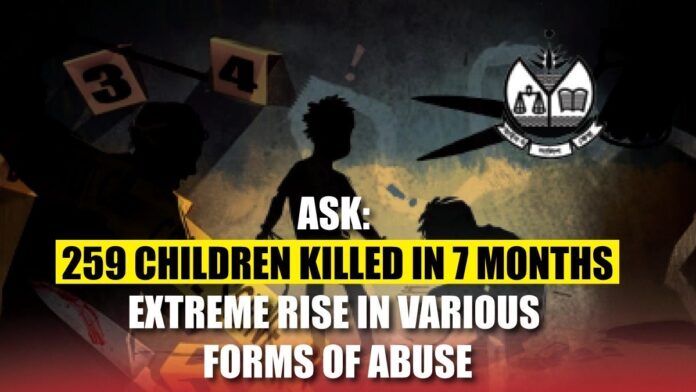In the seven months from January to July, the Child Helpline run by the Department of Social Services to help children in distress received 26,100 calls seeking assistance. In the same period last year, the helpline had received 19,265 calls. Compared to last year, there were around 7,000 more requests for help regarding incidents of child abuse and violence this year.
Statistics from the human rights organization Ain o Salish Kendra (ASK) also show an increase in violence and abuse against children.
According to their data, 640 children were victims of abuse in the past seven months, compared to 463 during the same period last year. In the first seven months of this year, 306 children were raped, compared to 175 last year. The year before that (2023), there were 618 incidents of violence and 194 child rape cases during the same period.
However, child killings in the past seven months have decreased slightly compared to last year. During this time, 259 children fell victim to brutal murders — killed by mothers, fathers, stepmothers, relatives, neighbors, and criminals. Fourteen of them were raped before being murdered. Seventy-five died from physical abuse. The bodies of 35 children were recovered after they went missing.
In the same seven-month period last year, 325 children were killed. The killings during the violent events of July–August last year are not included in this figure. In the first seven months of 2023, 292 children were killed, and in 2022, the number was 293.
Calls to the Department of Social Services’ Child Helpline 1098 are also increasing. In 2024, there were about 4,000 more calls related to child abuse and violence than in 2023. In 2023, the helpline received 15,785 calls, almost double the 8,021 calls in 2022.
The helpline, established to assist children, receives calls for help from the children themselves, their parents, guardians, or others, regarding abuse, legal aid, physical and mental health issues, school-related matters, and more.
Chowdhury Md. Mohayemen, Manager of the Bangladesh Child Helpline, said that from January to July this year, the helpline received 491,267 calls related to children. Of these, 26,100 were about child abuse and violence. In the same period last year, there were 242,195 calls, meaning there was a 103% increase in calls in the first seven months of this year. He noted that such calls have been increasing every year.
The Bangladesh Police website publishes crime statistics, including murder, robbery, and mugging, but it does not list child murders separately.
Experts say that family unrest, depression, mental illness, drug addiction, and marital conflict lead many parents to vent their anger, frustration, and hopelessness on children, increasing child abuse. They stress the need for more restrained and humane behavior towards children, regular communication among family members, mutual respect and cooperation, and creating a safe and loving environment for children.
Dr. Muhammad Umar Farooq, Professor of Criminology and Police Science at Mawlana Bhashani Science and Technology University, said that most incidents of child murder and abuse occur within families. Tensions between parents are one major cause, but killings outside the family have varied reasons.
ASK Senior Coordinator Abu Ahmed Faizul Kabir said, “When children are victims of human rights violations, it is not only a failure of law and justice but also a moral failure of the state and society. This trend is deeply alarming. We hope for effective steps to ensure the protection of children as quickly as possible. When children are abused, we must realize that we have failed to ensure their safety.”
He added, “The statistics on child abuse this year are truly concerning. I had hoped that after changes in governance, such incidents would decrease, but in reality, they have not.”
Of the 259 children murdered this year, a random review of 20 cases revealed that most were killed by parents, stepmothers, relatives, neighbors, and criminals, often under the age of 12. Analysis showed that in 12 of the 20 cases, 16 children were killed by people close to them — often due to family disputes. In two separate cases, stepmothers killed the children. In one case, a father killed his child and then attempted suicide. In three cases, children were sexually assaulted before being murdered. In another three cases, neighbors killed children over previous disputes. One child was killed over a mobile phone game, and another over drug use.
On July 13, in Bhaluka, Mymensingh, a mother and her two children were brutally hacked to death. The killer was none other than the children’s uncle, Nazrul Islam, who confessed in court after being arrested. Nazrul had been living in his elder brother Rafiqul Islam’s home in Bhaluka after being released on bail from prison. Though he drove an auto-rickshaw, he did not contribute to household expenses, which angered his sister-in-law Moyna Begum. Disputes grew, leading Nazrul to kill Moyna, seven-year-old Raisa Akhter, and two-year-old Md. Nirab with a machete at night.
On March 5, while visiting her sister’s in-laws’ home, an eight-year-old girl in Niznanduali village, Magura, was raped late at night. She died on March 13 while receiving treatment. The accused was her sister’s father-in-law, Hitu Sheikh, who was later sentenced to death.
On July 7, in Bibandi village, Srinagar, Munshiganj, Shanta Begum drowned her six-month-old twin sons in a pond due to poverty and family conflict. She later confessed in court.
On January 30, in South Banasree, Dhaka, a three-year-old girl was murdered. Her mother, Tasnim Chowdhury Chhoya, was arrested. Tasnim was the second wife of SM Atikul Islam Suman, who lived with his first wife in Siddheshwari. Tasnim, living separately with her six-month-old son and three-year-old daughter Ayasha, assaulted both children in anger over family disputes. Ayasha died as a result.
On July 6, in Sarail, Brahmanbaria, police recovered the body of a fifth-grade girl from the second floor of a mosque. She is believed to have been sexually assaulted and then murdered.
On July 13, in Kutirchar village, Kamarkhand, Sirajganj, seven-and-a-half-year-old Hajera Khatun was killed by her stepmother, who stuffed her body into a sack and left it in a bucket inside the house.
Professor Dr. Khairul Chowdhury of the University of Dhaka’s Sociology Department said that the moral strength people once had in Bangladesh is no longer the same. Violence and corruption are making society unstable. In such a situation, society has a responsibility, but so do parents. The state must also do more — especially to engage the public in fostering greater sensitivity toward children’s issues.





